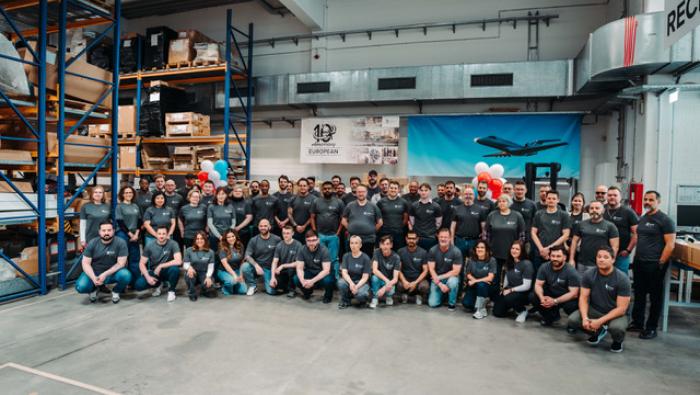Five years after its founding in 2007, Amac Aerospace has significantly strengthened its credentials as a business aviation services group with the opening of its third hangar in Basel, Switzerland, and a new maintenance, repair and overhaul (MRO) facility in Istanbul, Turkey. Amac CEO and group executive chairman Kadri Muhiddin told journalists gathered before the September 14 launch party for the expanded Basel facility that the company is no longer purely a completions specialist and can now offer a range of MRO services, up to D-checks on the largest bizliners.
Amac’s aim is to draw on its specialist knowledge of business aircraft interiors to differentiate itself from other MRO organizations that specialize mainly in airliner support. “We won’t do airliners, and airline MROs don’t have the know-how to maintain these interiors. The most value is in this,” Muhiddin told AIN, before dancing the night away with several hundred guests in the new hangar, in the shadows of a 777-300 that is undergoing executive completion.
“We are not just a completions center; we are an EASA-approved MRO,” he said, while adding that at present all its completions work is from Middle East customers, including governments, and mainly from Saudi Arabia, Qatar and the United Arab Emirates. “At the moment we are in dialogue with other [potential] customers from the Middle East.”
COO Bernd Schramm said that the company wants to “find the right balance” between completions and maintenance. “At the moment we are 60 percent completions but maintenance is more stable, which is why we’ve decided to go into maintenance more,” he said.
Amac is already approved to undertake heavy and base maintenance on Boeing 777s (since 2010) and Airbus A330/340s (2012) and expects to receive Boeing 747-400/-400/8i approval later this year. In May the facility–whose three hangars total 231,000 sq ft–became a Boeing warranty service center.
“We have done phenomenally well in winning completion, refurbishment and maintenance work contracts to the point that we have a secure and stable workload until 2014,” said Muhiddin, whose other interests include a consultancy at London Stansted Airport in the UK, and a small airline in Turkey. “Amac Aerospace handled numerous projects in 2011 and will deliver a 777 and several ACJ and BBJ refurbishment projects this year.”
Part of the business plan for its new facility in Turkey is to lead its efforts as Pilatus’s newly appointed Middle East distributor for the PC-12 turboprop single. “The PC-12 is a great machine. Once one or two people buy it in the region it will open their eyes,” predicts Muhiddin. “It offers [for example] $695 an hour [operating costs] versus $1,000 for a jet.” He added that the aircraft can operate to and from relatively short runways, with a variety of surfaces, and is pressurized and has modern avionics. “We will demonstrate it at Jebel Ali [the MEBA show in Dubai this coming December].”
At the same time, Schramm acknowledged, “the market as a whole is not strong at the moment, but there is still enough [activity] to keep all the completion centers happy.” He observed that the setbacks with Boeing’s new 787 have been to blame in part for the delay in some completions coming to market, given that there were 12 or 13 private versions of that aircraft in the Boeing backlog.
“Having said that, there are still 787-8s in the market that are waiting for completions,” added Muhiddin. “We will do our first one next month but there will continue to be a shortage of slots… in Europe there are only three centers that can handle widebody aircraft and in the U.S. there are five, and each aircraft takes two-and-a-half to three years to do. [Meanwhile] no facility can take two 747s at the same time.”







